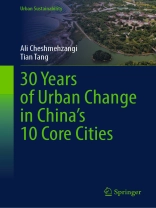As a continuation of our award-winning book ‘China’s City Cluster Development in the Race to Carbon Neutrality’, this book covers China’s major urban changes over the last 30 years. Unlike the previous book, where we highlighted regional development issues, this book explicitly explores the city cases, particularly those that are considered core cities in China. Based on the micro-historical analysis of China’s urbanization trend and urban development patterns, we see that cities in China have played a significant role in driving the country’s sustainable development agenda. In a way, they have had both positive and negative impacts on achieving sustainable development. We look at these last three decades mainly because, during this period, China’s urbanization became unprecedented, the central government made several pledges and signed many international agreements related to sustainable development, and China grew rapidly to become the second global economic power. Aligned with the overarching Belt and Road Initiative (BRI) and the more recent Carbon Neutrality Plan (CNP), Chinese core cities played a significant part in regional development, urban-rural relations, industrial clustering, the development of free trade zones and special economic zones, etc. All these recent developments are due to China’s ongoing urbanization and urban development.
‘30 Years of Urban Change in China’s 10 Core Cities’ is a mapping study of China’s core cities and their changes over three decades of rapid urbanization, urban growth, and economic development. We explicitly highlight each selected city’s development trends, sustainable development plans, and major strategies. In this Volume (out of our two ‘connected’ volumes), we summarise lessons learnt from all 10 case study examples, and we hope they can be utilized for other developing and rapidly urbanizing nations. We expect this book to be a valuable resource for local governments, authorities, urban planners, urbanists, practitioners, developers, and urban researchers. We trust China is no longer a developing country, and much of these recent progressions are owed to its structured urban development strategies, robust governmental structure, and progressive attitude to growth and development. Hence, this topic coverage at the point where China’s urbanization is shifting to high-quality urbanization is essential and beneficial to multiple stakeholders.
Inhaltsverzeichnis
China’s Urbanisation Progress and Urban Change: Sustainability cannot be divorced from China’s Future Development.- Beijing: Balancing Tradition and Modernisation in a Metropolis with Multiple Agenda on Sustainability and Innovation.- Shanghai: A Vibrant Metropolis where Modernity meets traditions through Cultural Fusion.- Shenzhen: A modernity through the promotion of Innovation, Technology, and Education.- Guangzhou: China’s Strategic Southern Gate with a Global Outlook for Innovation.- Hangzhou: A Regional Urban Hub for Dynamic Fusion of Tradition and Innovation.- Chengdu: From Regional Ascendance to Integrating a Regional Innovation Ecosystem.- Nanjing: A Confluence of History, Innovation, and Modernity.- Wuhan: A Blueprint for Urban Innovation, Resilience, and Sustainable Development.- Tianjin: From Coastal Advantages to Large-Scale Urban Transformation.- Suzhou: Lessons in Economic Integration, Cultural Preservation, and Green Urbanism.- Knowledge Share between Cities and Progression on China’s 30 Years of Urban Change.
Über den Autor
Ali CHESHMEHZANGI is a Full Professor and Head of the School of Architecture, Design and Planning (ADP) at the University of Queensland, where he leads the school and researches across the fields of architecture, design, and planning/urbanism. He has been the World’s top 2% field leader for two consecutive years, recognised by Stanford University. He is among the top 30 global scholars in the urban sustainability research area. Ali is internationally known for his scholarly contribution and extended work on climate resilience and sustainable urbanism research. Ali has a wealth of experience, expertise, and a strong commitment to innovation and excellence in the fields of architecture, design, and planning, the three core disciplines of his School at UQ. With a career spanning over two decades, he has made significant contributions to the academic and professional communities, with a focus on sustainable and environmentally conscious design. Prior to joining UQ, Ali held several strategic leadership and senior managerial roles, such as Vice-President for International Engagement and Global Partnership, Founding Director/Head of the Center for Innovation in Education and Research, Head of the Department of Architecture and Built Environment, Founding Director of the Urban Innovation Lab, Director of a university-wide Teaching and Learning platform, Director of International Research Network for Rural and Urban Development, Head of Research Group for Sustainable Built Environment, co-director of university-wide research priority areas, Director of Center for Sustainable Energy Technologies, and Interim Director of Digital Design Lab. So far, Ali has published over 500 journal papers, articles, conference papers, book chapters, and reports. He also has 30 other academic books, three of which have received awards at the national, provincial, and municipal levels. He also has received international awards and recognition for his research on urban resilience studies and sustainability research, as well as a Vice-Chancellor’s award for his impactful contribution to higher education.
Tian TANG is an independent researcher focused on analysing China’s urban and regional transitions and urban sustainability research. She co-authored a book with Ali Cheshmehzangi, titled “China’s City Cluster Development in the Race to Carbon Neutrality” (2022), which received a prestigious national award from Springer in November 2023. For almost a decade, Tian has worked with several local agencies and consultancy firms, with significant research work in Sichuan, Shanghai, Guangdong, Hainan, Hunan, and Chongqing, all in China. Tian is experienced with fieldwork activities in China and currently focuses on analysing urban transitions in urban clusters and specific regions in China, while exploring global case study examples, too. With extensive collaborations with the industry, relevant institutes, and governmental agencies, Tian has developed an extensive profile in urban sustainability research. In 2016 and then from 2019 onwards, her extended work included several case study research works as an independent research associate member and industry collaborator. In 2020-22, she focused on carbon neutrality research, case study reports, regional analysis, Chinese city clusters, and ICT-driven smart-resilient urban transformations. To date, Tian has 120+ reports, papers, and conference/workshop presentations and is co-author of an award-winning book.












